Heading with Turner Harris
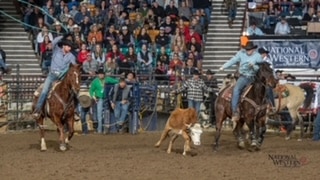
[Photo: submitted]
“I think there are so many kids that are coming up that handle a rope so well. To get to the next level, they need to concentrate on horsemanship,” explained champion team roping header Turner Harris.
Turner said that in team roping, a head horse starts reading their rider and anticipates everything. “There are a lot of kids that want to reach, and that’s good, but they need to really learn how to keep riding their horse through the throw and keep the horse moving forward so it doesn’t duck,” stated Harris.
A head horse that starts ducking or shouldering, before or when the header catches can cause misses and bad handles for the heeler. “There is a reason the pros can keep roping fast and reaching, they keep their horses working and use horsemanship to keep winning,” affirmed Harris.
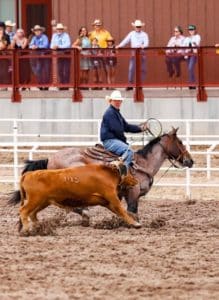
[Photo: submitted]
Harris recommends that making a conscious effort to keep pushing your horse through your throw in the practice pen and putting an emphasis on your riding will help. “Keeping the horses shoulders up and forward and not letting them duck back is crucial in the practice pen. Let the steers hit a couple of strides going down the arena before going left,” stated Harris.
The header also mentioned that everything all happens faster at the rodeos. “This is why it’s even more important to do your homework at the practice pen; those horses get to reading you and be aware of it at the rodeo as well,” said Harris.
A good heading horse has to score well. “I score a lot in the practice pen. What type of scoring I do will depend on what level the horse is at. With the young ones, especially, I’ll do a lot of walking scores when I start them to keep them flat and level,” Harris noted. “Handling young horses is a time to handle with care, explained Harris, “Young horses are fragile. Heading is intense, so take your time and handle those young horses slowly,” advised Harris.
A qualitiy that Harris said he looks for in a heading horse is being quick footed. “I like head horses a little smaller than some, but they have to have good bone no matter the size and be athletic. If they ride around nice and are broke, there is a good chance they can make it in the heading,” Harris said.
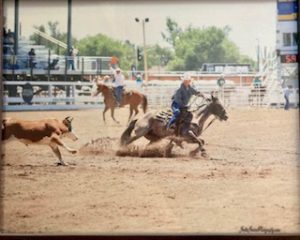
[Photo: submitted]
Harris has been riding and roping since he was young, which has been a few decades, but growing up in North Dakota, made it a little hard to rope in the winter. “I played basketball in the winter, and I think that helped with hand, eye coordination, and dribbling helped with timing. There is nothing that replaces handling a rope, but there are things you can do on the off-season to help it,” added Harris, “I always roped the dummy through the winters too.”
As far as having four seasons in North Dakota, there is a benefit to that as well. “People in North Dakota are tough; they have to have the mentality to not give up or quit and keep pushing forward. It all crosses over into the arena. Being tough and pushing forward is what it’s all about,” confirmed the cowboy.
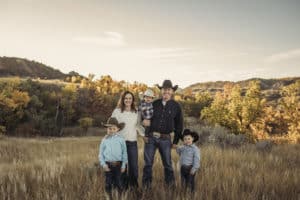
[Photo: submitted]
Harris has many roping accomplishments to his name, but he says his biggest ‘win’ is his family. He and his wife, Katie, have three boys: Coy (6), Ridge (3), and Tee (1). They are all following in his footsteps and you’ll find them with a rope in their hands. Harris has been the Badlands Circuit Champion (BSF) Average Champion Header two times, Reserve BSF Champion Header and has qualified for the BSF twelve times. When he isn’t in the arena, he is a full-time rancher northwest of Killdeer.
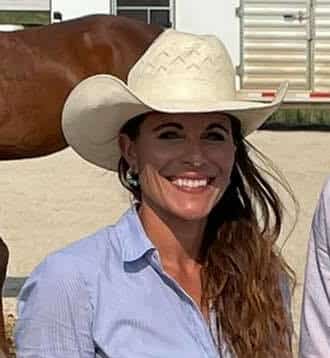
Tisa Peek is a long-time horse trainer, competitor in barrel racing and team roping, and writer about the equine. Rodeo and horses run deep in her roots. JT Family Equine is where she calls home, south of Bismarck, ND. Tisa, along with her husband, Jon, and boys, Blu and River, train horses and host clinics. Tisa is the host for Dakota Cowboy on BEK TV.
